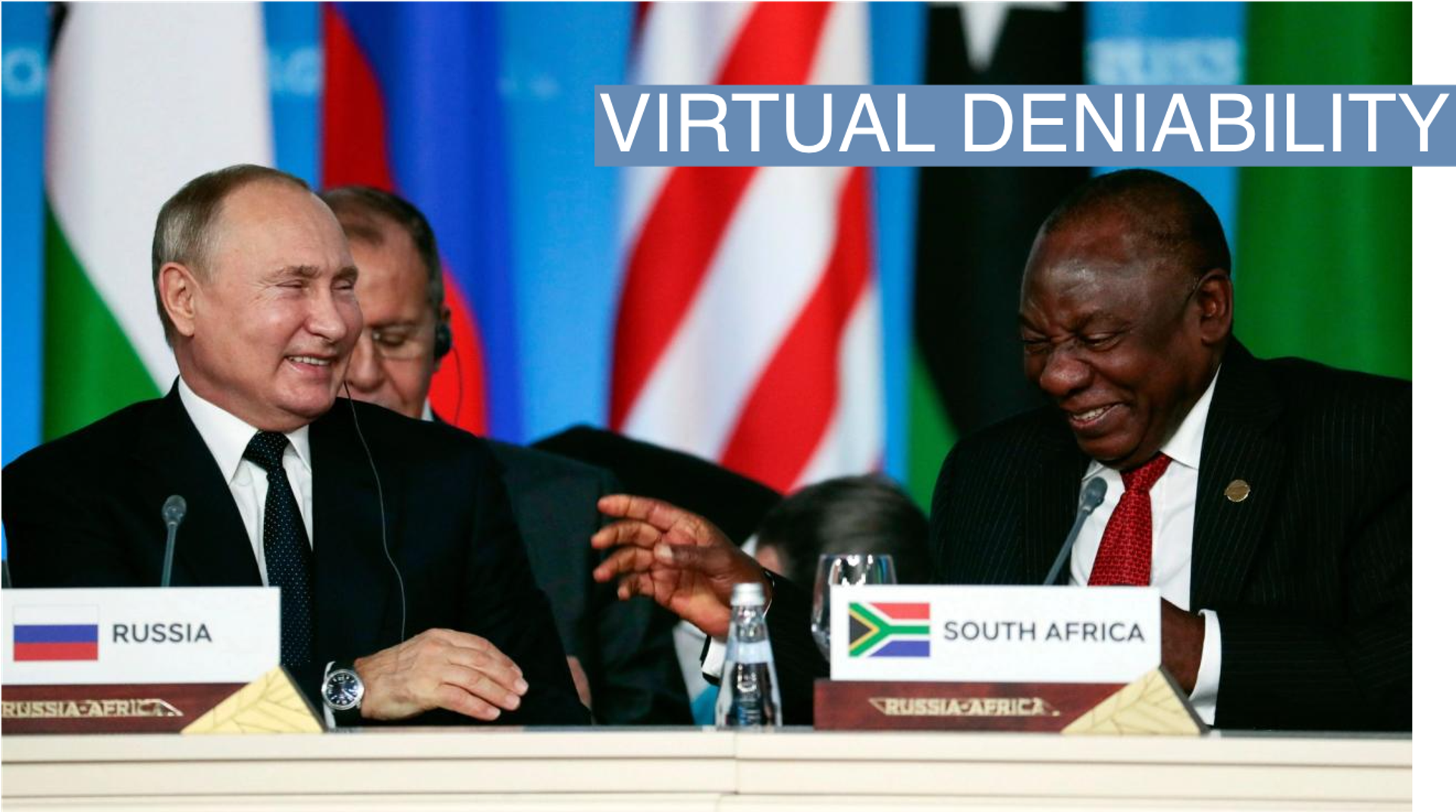The Scoop
JOHANNESBURG — South Africa is considering hosting the headline meeting of leaders from BRICS nations entirely online to avoid Russian President Vladimir Putin participating in person, people familiar with the matter told Semafor Africa.
The International Criminal Court issued a warrant for Putin’s arrest in March for alleged war crimes in Ukraine which South Africa, as a member of the ICC, is officially obliged to enforce. It’s hosting the 2023 annual summit of the BRICS nations — Brazil, Russia, India, China, and South Africa — in late August, to which Putin is invited. But Pretoria would rather he not show up, to prevent a diplomatic headache.
The virtual summit approach has been discussed by a committee of ministers appointed by President Cyril Ramaphosa to resolve issues connected with Putin’s arrest warrant, three people with direct knowledge of the proposal — a senior civil servant and two business leaders — told Semafor Africa. Under the plan, most summit events would still take place in South Africa, such as the high profile BRICS Business Forum and the meeting of foreign ministers. The meeting of heads of state would be the only part held online.
The cabinet may make a decision on the proposal as early as this week, the people said.
South Africa’s foreign ministry did not immediately respond to requests for comment.
Know More
South Africa is a signatory of the Rome Statute and a member of the ICC. That means the country would be theoretically obligated to arrest the Russian president if he entered the country.
The committee, appointed by Ramaphosa on April 28 and headed by Deputy President Paul Mashatile, includes Finance Minister Enoch Godongwana and Justice Minister Ronald Lamola. It is considering three other scenarios in addition to the virtual meeting: one in which Putin attends but it not arrested, another in which he is arrested and a third in which South Africa changes its laws to make it possible to ignore an arrest warrant that does not come through the United Nations Security Council, as is the case with Putin. However, it could take several months to change the laws.
Sam’s view
An online gathering would neatly solve South Africa’s Putin problem.
The government initially hoped it could dissuade Putin from attending. But if he agreed, it might convey weakness, undermining his carefully crafted image as a strong leader. South Africa also granted immunity to all the BRICS heads of state last month, but the government stated this was a technical procedure that did not guarantee Putin protection from arrest.
Still, South Africa would have to persuade its BRICS partners that an event with an online element is the best way to host a successful annual gathering.
Pretoria is mindful of alienating its partners in BRICS, as it tiptoes around various national interests. A no-show from Putin could spook other BRICS leaders, who may then opt to stay away. Beijing has apparently indicated to Pretoria that President Xi Jinping would not physically attend a summit if Putin was not physically present. Delhi has similar concerns, two of the people familiar with the matter said. In informal discussions between South African diplomats and their BRICS counterparts, it emerged that China did not like the idea of a virtual leaders’ meeting or a situation where Putin stayed away and others traveled to Johannesburg, according to two of my sources.
A BRICS gathering without Putin and Chinese President Xi Jinping would not command the same status. Indian diplomats have said in informal talks that the gathering would be incomplete without the two, all three of my sources told me.
The other option would be for South Africa to give up the chance to host the annual conference for which hosting rights rotate, allowing a partner like China to host it — but Pretoria is keen to avoid losing the opportunity to organize the event. Foregoing hosting the gathering is not a popular option in South Africa as it comes with tourism, trade and deal-making opportunities on its sidelines.
Brazil would not be an option as an alternative host because it would likely face the same ICC problems as South Africa since it is also a signatory to the Rome Statute, unlike China and India.
Paradoxically, a virtual summit might yet serve the interests of Putin, especially if the Ukrainian summer offensive gains significant traction on the battlefield. Leaving Russia under such circumstances might not be an option.
Room for Disagreement
“A virtual meeting will not help much as South Africa’s Brics partner will see it as a country with no backbone,” said David Monyae, Director of the Centre for Africa – China Studies at the University of Johannesburg. “Only if Putin willingly did not come will South Africa manage to host a decent conference.”
The View From Pretoria
Sanusha Naidu, a senior research fellow at the Institute for Global Dialogue think-tank in Pretoria, said South Africa’s options are limited. “It cannot deviate from its obligation to arrest Putin. Persuading Putin to stay away was South Africa’s best option. It can try and convince Putin that perhaps being online is better than physical in attendance,” she said.
Notable
- The war in Ukraine has turned the BRICS summit into an “alliance against the West,” according to Britain’s Daily Telegraph. “It’s been driven by Russia and China and specifically by the need to try and find these alternative spaces for commerce that are outside of Western norms and particularly Western sanctions,” an analyst told the paper.

